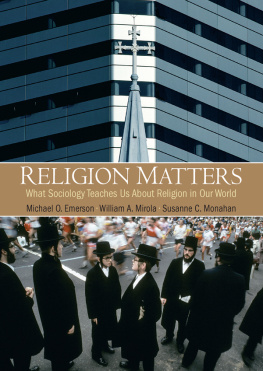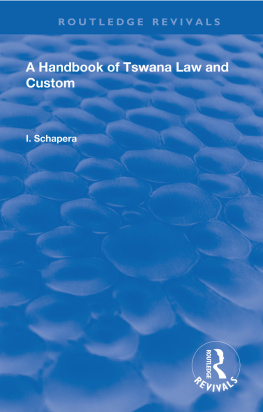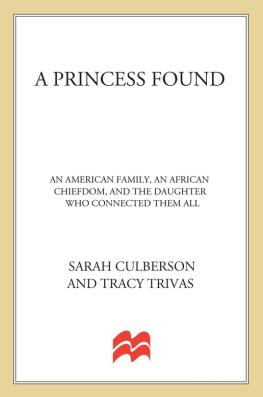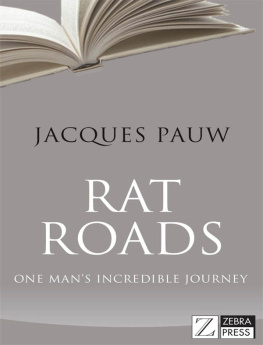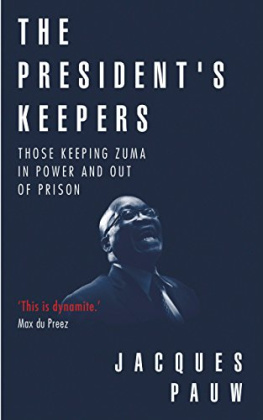AFRICAN ETHNOGRAPHIC STUDIES
OF THE 20TH CENTURY
Volume 54
RELIGION IN A
TSWANA CHIEFDOM
RELIGION IN A
TSWANA CHIEFDOM
B. A. PAUW
First published in 1960 by Oxford University Press for the International African Institute.
This edition first published in 2018
by Routledge
2 Park Square, Milton Park, Abingdon, Oxon OX14 4RN
and by Routledge
711 Third Avenue, New York, NY 10017
Routledge is an imprint of the Taylor & Francis Group, an informa business
1960 International African Institute
All rights reserved. No part of this book may be reprinted or reproduced or utilised in any form or by any electronic, mechanical, or other means, now known or hereafter invented, including photocopying and recording, or in any information storage or retrieval system, without permission in writing from the publishers.
Trademark notice: Product or corporate names may be trademarks or registered trademarks, and are used only for identification and explanation without intent to infringe.
British Library Cataloguing in Publication Data
A catalogue record for this book is available from the British Library
ISBN: 978-0-8153-8713-8 (Set)
ISBN: 978-0-429-48813-9 (Set) (ebk)
ISBN: 978-1-138-59731-0 (Volume 54) (hbk)
ISBN: 978-0-429-48696-8 (Volume 54) (ebk)
Publishers Note
The publisher has gone to great lengths to ensure the quality of this reprint but points out that some imperfections in the original copies may be apparent.
Disclaimer
The publisher has made every effort to trace copyright holders and would welcome correspondence from those they have been unable to trace.
Due to modern production methods, it has not been possible to reproduce the fold-out maps within the book. Please visit www.routledge.com to view them.
RELIGION IN A
TSWANA CHIEFDOM
B. A. PAUW
Published for the
INTERNATIONAL AFRICAN INSTITUTE
by the
OXFORD UNIVERSITY PRESS
LONDON NEW YORK TORONTO
1960
CONTENTS
Oxford University Press, Amen House, London E.C.4
GLASGOW NEW YORK TORONTO MELBOURNE WELLINGTON
BOMBAY CALCUTTA MADRAS KARACHI KUALA LUMPUR
CAPE TOWN IBADAN NAIROBI ACCRA
International African Institute 1960
The publication of this volume was assisted by a grant from the National Council for Social Research of the Department of Education, Arts and Science of the Union of South Africa, which is not, however, to be understood as approving any statement made or views expressed therein
PRINTED IN GREAT BRITAIN
TO THE MEMORY OF
MY LATE FATHER
AND TO
MY MOTHER
E XCEPT that it happens to be a first-fruit, a study such as this hardly calls for introduction. The importance of the subject matter, the careful collection of the material, and the academic as well as the practical equipment of the author should suffice to give Religion in a Tswana Chiefdom a good send-off.
The present study is a condensation of a thesis accepted by the University of Cape Town for the Ph.D. degree in 1955, under the guidance of Professor Monica Wilson. The authors experience as missionary and anthropologist amongst the Tswana-Tlhaping cluster of the Bantu family has given him special qualification for the work. The labours of his own promoter, of Language, Schapera, Willoughby, J. T. Brown, and others have provided Dr. Pauws superstructure with the essential basic material.
It may be looked upon as mere chance that Religion in a Tswana Chiefdom and the Rev. John V. Taylors The Growth of the Church in Buganda should be, so to speak, contemporaries. Moreover, Professor Bengt G. M. Sundkler is bringing his Bantu Prophets in South Africa up to date. If this be looked upon as chance, one feels like saying with the poet: It chanced that God eternal chance did guide.
Dr. Pauws continual reference to Sundklers study on Separatism has produced some very fruitful comparisons between the Tswana and the Nguni, which should prove valuable for an eventual overall study of Bantu Separatism. It is indeed gratifying that the present author has throughout endeavoured to see the Tswana-Tlhaping situation in its wider setting.
On the other hand Religion in a Tswana Chiefdom is indeed a study in depth, and is thereby related to the Uganda study. Up to now the problems of the Christian Mission in Africa have been tackled one by one, each one being examined as it appears in a number of different situations. So, for instance, the problem of marriage in Africa and the Church and politics in Africa have claimed our attention in recent years.
There is, however, the other method, which engages attention on the whole life of the Church in a given situation or a limited environment. We have the feeling that the Group Survey of the Training of the Ministry in Africa, sponsored by the International Missionary Council, may have paved the way for this latter method. In any case, Dr. Pauw may be congratulated on the completion of this study, and may rest assured that his labour has not been in vain. More and more the results of the impact of the Christian message on heathenism will have to be weighed and the reaction of the latter to the conquests of the Cross will have to be determined.
Approximately a quarter of a century ago Dr Edwin W. Smith, in his presidential address before the Royal Anthropological Institute, broke a lance for the proper place of social anthropology in the curriculum for the training of missionaries. Even if his plea may not have had the desired result, the reason certainly was not that this newer branch of study encroached on a realm where it has no jurisdiction. For the Christian faith and its Mission have vast sociological implications and while anthropology dare not touch the motive or the obligation of the missionary, it can and ought to criticize his methods.
After the massive labours of men like H. A. Junod and Sundkler on the eastern front, we are greatly heartened by this achievement on the less-known western front. Once more a missionary has contributed to make anthropology almost a missionary science. Religion in a Tswana Chiefdom deserves a place at least in all our libraries, and should be constantly at the elbow of our missionaries, administrators, and anthropologists.
G. B. A. G ERDENER .
Stellenbosch, Christmas, 1958.
T HIS book is a study of present-day religion in a rural Bantu society, viewed within the wider framework of their social structure and economy. Being a missionary it is hardly necessary to explain why I chose to investigate this particular subject, but my interest was very much stimulated by Dr. Sundklers study of Zulu Separatist or Independent Churches, and from the outset I wish to record my indebtedness to his valuable work. Dr. Sundklers book provided numerous suggestions of lines along which a study such as this could proceed. However, although I also paid particular attention to the Separatist Churches I did try to make it more than a mere parallel of Dr. Sundklers study among a different people. In the first place I chose a different approach by concentrating on a restricted area and investigating that as intensively as possible. On the other hand, within this restricted area I tried to conduct my investigations on a wider front by studying the social structure and economy in some detail (although only a short sketch of this has been included in this book), and by including in the study all aspects of present-day religion, i.e. not only the Separatist Churches, but also the non-Separatist Churches, and the existing remnants of traditional pagan religion.




